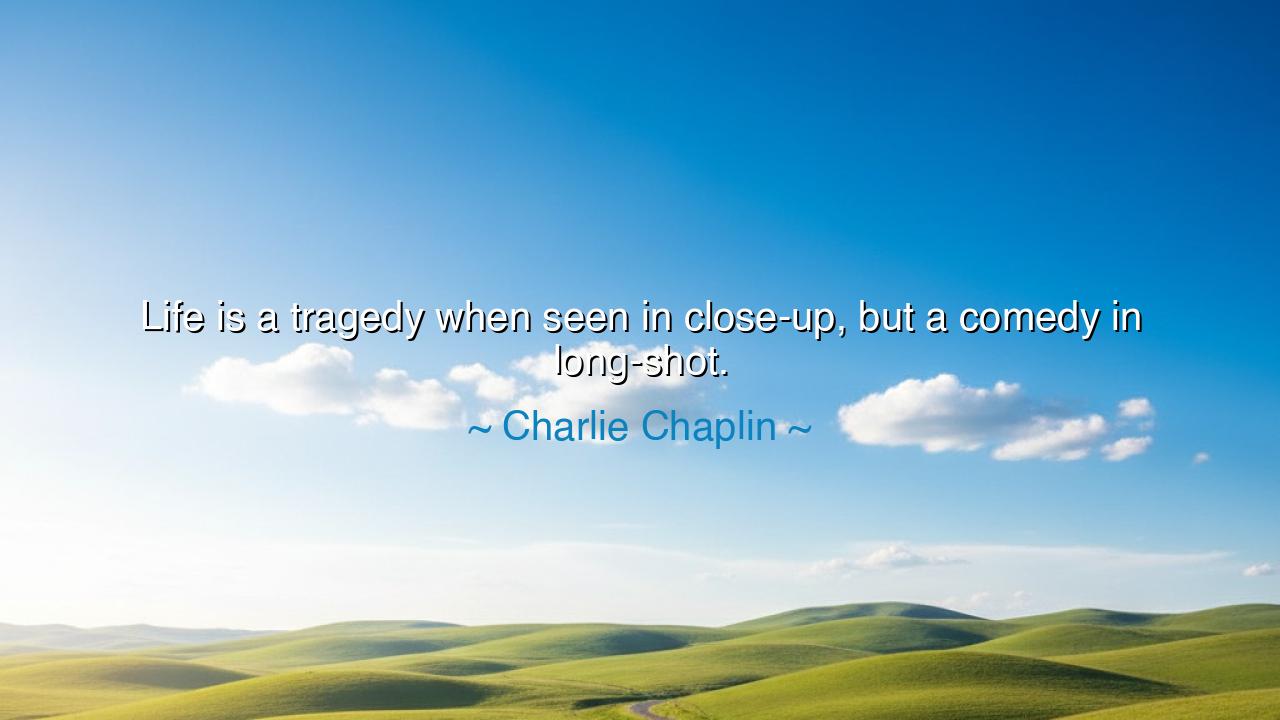
Life is a tragedy when seen in close-up, but a comedy in






“Life is a tragedy when seen in close-up, but a comedy in long-shot.” — so spoke Charlie Chaplin, the silent poet of motion and laughter, whose eyes saw both the sorrow and the splendor of the human story. Behind this deceptively simple phrase lies the profound wisdom of one who had lived through hunger, humiliation, and hardship, and yet chose laughter as his rebellion against despair. In these words, Chaplin reveals the dual nature of existence — that suffering, when viewed too closely, breaks the heart; but when seen through the lens of time and perspective, reveals its hidden beauty, its absurdity, its rhythm within the grand theater of life.
The origin of this quote comes not from a philosopher cloistered in study, but from an artist of the streets — a man who had known poverty in the slums of London, who had watched his mother lose her mind, and who had risen, through the fragile magic of comedy, to move the hearts of millions. Chaplin understood life not in theory but in flesh. His laughter was not ignorance of pain, but a transformation of it — a way of seeing suffering from afar, as one might see the stars scattered across the night: beautiful, distant, necessary. In his films, the tramp weeps, stumbles, starves — and yet always rises again, his bowler hat tilted toward hope. For Chaplin, tragedy and comedy were not opposites, but two faces of the same truth.
When he says life is tragic up close, he speaks of the immediacy of pain — the moments when loss, failure, and injustice pierce us so sharply that we cannot yet see their purpose. In those moments, life feels cruel and senseless, and laughter seems like blasphemy. But when time distances us from the wound, we begin to glimpse the larger pattern, to see how even our suffering shaped us, how chaos became a strange kind of order. This is the “long-shot” — the divine perspective, where the tangle of existence resolves into harmony, where tragedy turns into wisdom, and sorrow into story.
The ancients knew this truth well. The Greek playwrights called it catharsis — the purifying release that follows the recognition of one’s fate. Socrates himself, when condemned to death, drank the hemlock calmly, saying that no evil can befall a good man. In the short view, his death was a tragedy — a miscarriage of justice. But in the long view, it became the foundation of philosophy, the seed from which generations of thinkers would grow. So it is with all human suffering: up close, it wounds us; from afar, it ennobles us. The distance of time transforms pain into meaning, and even death into legacy.
Consider Chaplin’s own life as a mirror to his words. During the filming of The Gold Rush, he faced exhaustion, financial ruin, and the collapse of his marriage. Yet, in that same film, he created the immortal image of the tramp eating his own shoe — a scene at once heartbreaking and hilarious. To the audience, it was comedy; to Chaplin, it had been lived tragedy. But he understood something sacred: that if one can learn to laugh even at sorrow, one has already begun to transcend it. Humor, in his hands, became the bridge between suffering and survival, between despair and dignity.
And so, Chaplin’s quote is not simply about art — it is about perspective. It teaches us to step back from our sorrows, to see them in the context of a greater whole. When we stand too close to the moment, life feels unbearable. But when we take the long view — when we remember that even stars are born from the collapse of dying suns — we realize that nothing is wasted. Our hardships, our heartbreaks, our humiliations — all are threads in the tapestry of becoming. From afar, they reveal the strange, radiant comedy of being human: the stumble that leads to strength, the mistake that leads to wisdom, the loss that teaches love.
Therefore, my child, when life strikes you down and the world feels small, step back. Look upon your pain as if it were part of a great play whose ending you cannot yet see. Ask not, “Why must I suffer?” but rather, “What story is this suffering telling?” Learn to laugh — not in denial, but in defiance. For laughter is the soul’s way of bowing to the mystery, of saying, “Even this I can survive.”
For truly, life is both tragedy and comedy, and to live wisely is to hold both in your heart. The wise do not flee sorrow, nor do they drown in it; they stand far enough away to see that it, too, has its music. When you can see your tears and your laughter as notes in the same divine song, then you will understand what Chaplin meant — that even the most painful moment, when seen from eternity, is but a gesture in the grand, cosmic comedy.






AAdministratorAdministrator
Welcome, honored guests. Please leave a comment, we will respond soon